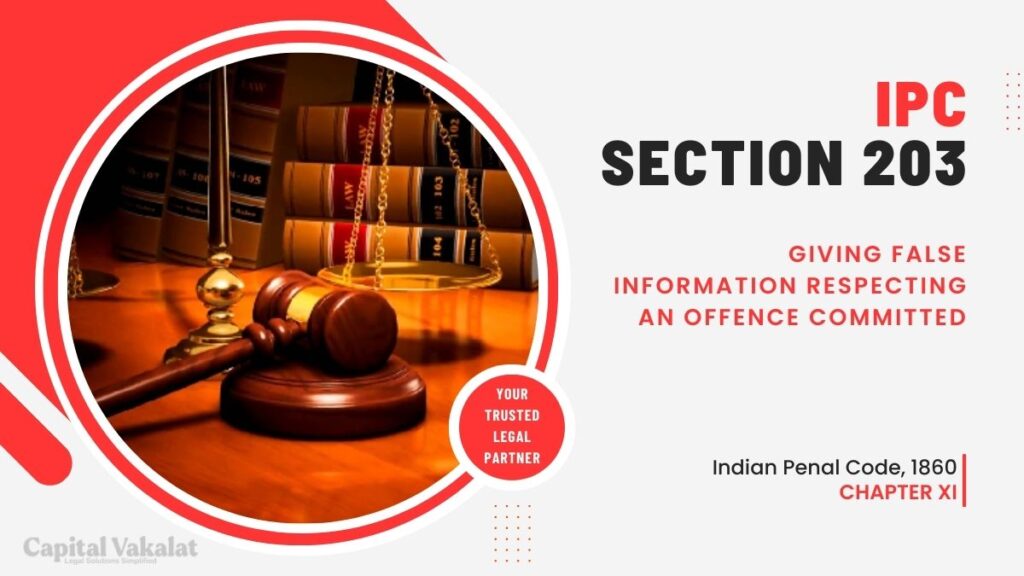Section 203 of the Indian Penal Code (IPC) is a vital provision that deals with the offense of “Giving False Information Respecting an Offence Committed.”

This article will delve into the intricacies of this section, its importance in the legal framework, its consequences, and its role in maintaining justice.
Introduction
Section 203 IPC plays a crucial role in the Indian legal system by addressing the act of providing false information concerning an offense. This section aims to ensure the integrity of investigations and legal proceedings, emphasizing the importance of truth and honesty in legal matters.
Understanding Section 203 IPC
To comprehend the significance of Section 203 IPC, it is essential to understand its key elements.
Elements of Section 203 IPC
Section 203 IPC consists of the following elements:
1. False Information
The provision applies when an individual intentionally provides false information.
2. Regarding an Offence Committed
The false information must pertain to a criminal offense that has been committed.
3. Knowledge of Falsity
The person providing false information should have knowledge of the information’s falsity.
Penalties for Violating Section 203 IPC
Violating Section 203 IPC is a serious offense and is punishable under Indian law. The penalties may include fines and imprisonment, as prescribed by the court based on the severity of the false information and its consequences.
Importance of Section 203 IPC
Section 203 IPC is of utmost importance in maintaining the credibility of legal proceedings. It ensures that the justice system is not hindered by dishonest practices, helping to uncover the truth and bring the guilty to justice.
Legal Implications
When an individual is found guilty of violating Section 203 IPC, they may face legal consequences that can tarnish their reputation and future prospects. It is crucial to recognize the gravity of this offense.
Case Studies
Examining real-life case studies can provide a deeper understanding of how Section 203 IPC has been applied in various legal scenarios. These cases highlight the significance of honest reporting in legal matters.
The Role of Section 203 IPC in Maintaining Justice
This section of the IPC plays a pivotal role in ensuring justice is served. It prevents the manipulation of legal proceedings through false information, safeguarding the rights of the innocent.
Challenges in Implementing Section 203 IPC
While Section 203 IPC is a powerful legal tool, there are challenges in its effective implementation. Addressing these challenges is vital to maintaining the section’s efficacy.
Recent Amendments
To keep pace with the evolving legal landscape, Section 203 IPC has witnessed amendments. Understanding these changes is essential for those operating within the legal framework.
Conclusion
Section 203 IPC is a crucial provision in the Indian legal system that upholds the principles of honesty and truthfulness in legal proceedings. Violating this section has severe consequences, emphasizing the importance of maintaining the integrity of the justice system.
Frequently Asked Questions
What are the potential penalties for violating Section 203 IPC?
Penalties may include fines and imprisonment, depending on the severity of the false information.
Can Section 203 IPC be applied in cases of mistaken identity?
This section generally applies when false information is provided intentionally. Mistaken identity may not fall under its purview.
Are there any defenses available for individuals accused of violating this section?
Defenses may include lack of intent or evidence supporting the veracity of the information provided.
How can individuals report a violation of Section 203 IPC?
Reporting a violation should be done through the appropriate legal channels, such as the police or a legal representative.
How can I avoid violating Section 203 IPC?
Avoid providing false information related to criminal offenses and ensure your statements are truthful.
What is the maximum penalty for violating Section 203 IPC?
The penalty varies based on the severity of the false information and can include fines and imprisonment.
Are there any exceptions to the application of Section 203 IPC?
The section generally applies to cases of intentional false information, with limited exceptions.
Can Section 203 IPC be used in civil cases?
This section primarily pertains to criminal offenses and may not apply in civil cases.
What legal recourse is available to someone falsely accused under Section 203 IPC?
Falsely accused individuals can seek legal remedies, including defending themselves against the allegations and providing evidence of their innocence.